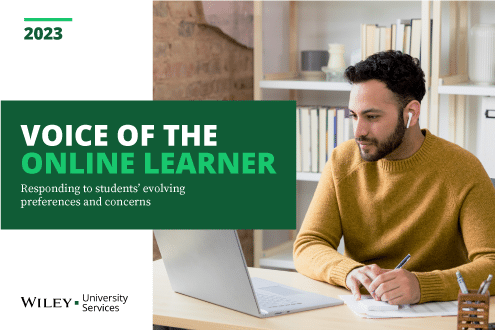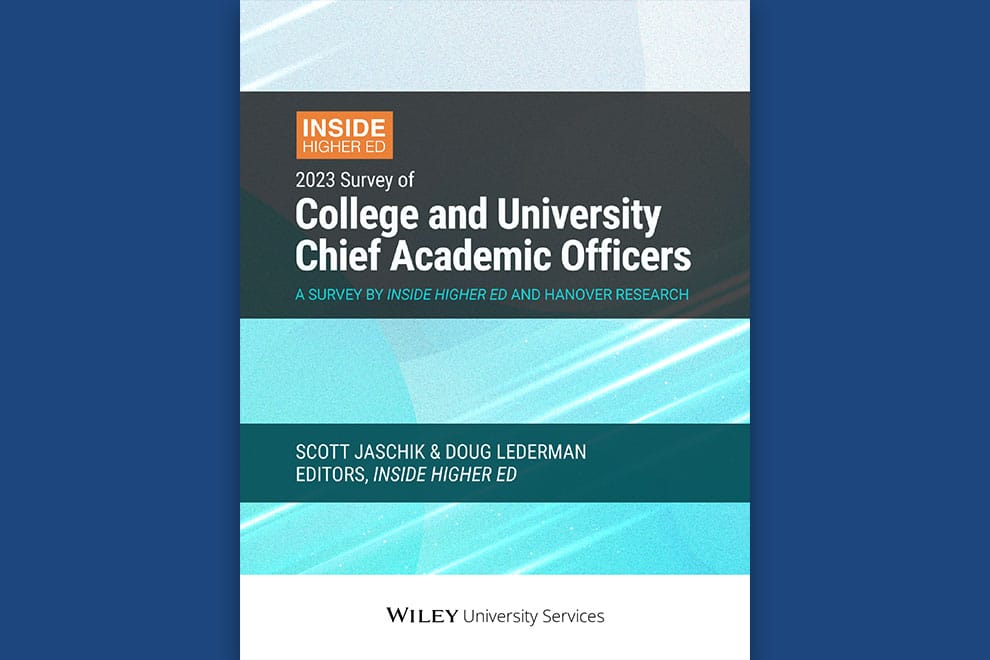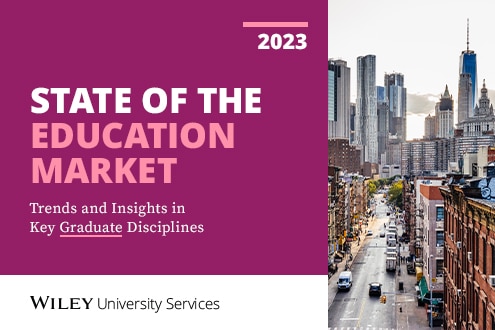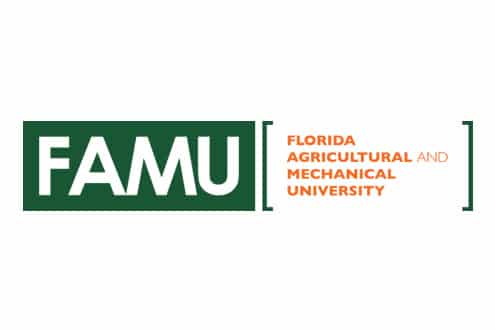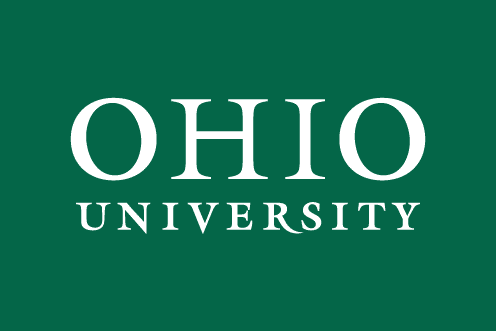Speaker 1:
You’re listening to An Educated Guest, a podcast that brings together great minds in higher ed to delve deeper into the innovations and trends guiding the future of education and careers hosted by the executive vice president and GM of Wiley University Services and Talent Development, Todd Zipper.
Todd Zipper:
Hello, I am Todd Zipper, host of An Educated Guest. On today’s show, I speak with Dr. Marni Baker Stein, provost and chief academic officer at Western Governors University, where she leads academic programs and faculty and supports the university’s design, evaluation and student experience teams. She is responsible for driving the university’s focus on academic quality and student success and has contributed to making Western Governors one of the leading online universities in the United States today.
Todd Zipper:
The key takeaways from our discussion. First, how WGU uniquely personalizes education around individual learners needs to be the world’s most student-centric university. Second, how WGU has become the leader in forwarding competency-based education and how that translates into servicing skills within the workplace. Third, how WGU was inspired by healthcare to pioneer their unique 360 degree case management model called The Community of Care. Fourth, how WGU is democratizing access to skills-based hiring and empowering learners with a skills-based achievement wallet through the Open Skills Network. And last, WGU’s sophisticated approach to learner outcomes data and how they hope to advance competency-based education in the future. Thank you so much for being here today, Marni.
Dr. Marni Baker Stein:
Oh, so happy to be here. Thanks for having me.
Todd Zipper:
All right. So, let’s jump right into Western Governors University. It’s an incredible success story. One that has influenced so much in higher education, really for well over a decade now. You are, I think, approaching 130,000 full-time learners, maybe more, throughout the US and the territories. You’ve pioneered a bunch of stuff in online learning, in competency-based education, in affordable higher education. And you also call yourselves the world’s most student-centric university, which I absolutely love. So before we jump in to talk about WGU, can you tell us a little bit about your background prior to joining the university?
Dr. Marni Baker Stein:
Sure. I’ve been working in higher education all my life. I started out working in English as a second language and international programs at UCSB at University of California, Santa Barbara in the US. Since then, I have sort of been catapulted into roles where these different institutions I’ve worked for, the University of Pennsylvania, Columbia, the University of Texas system have been experimenting with online as a capability of the university and of the university system to support the future of learning. And that was incredible work. I had every one of those institutions where I was experimenting with new learning models and new programming models and new operational models for online and hybrid education.
Dr. Marni Baker Stein:
And a couple of years ago, I met Scott Pulsipher at a conference, who’s the CEO and president of Western Governors University. And he said, “Why don’t you come to WGU and do this work at a place that actually is 100% committed to that future.” And I thought, “Yeah, that’s not a bad idea.” So, five years ago, almost five years ago, I came to WGU and I’ve never looked back, because he was so right. It is incredible to be doing this transformational work at an institution that is centered. It’s our whole purpose. Our whole mission is centered on a digital future.
Todd Zipper:
That’s awesome. So, let’s jump into WGU. I’d love to understand the history of it. I know that it was founded in the late ’90s. It’s got an interesting name with Western Governors and it’s pioneered so much. So how did it get its founding and the foundation that’s now this incredible growth story in higher education?
Dr. Marni Baker Stein:
Sure. So, it really is an amazing story, because way back in the ’90s, when I think Mosaic had come out and then there was Netscape and browsers were emerging and people were getting a sense of what the internet was. There were 19 Western Governors of states out here in the West who met and were like, “There’s something here. We could use this to reach out to individuals who are in rural areas, who have some college and no degree, who have work experience, who have ambition, but just don’t have access to physical campuses or the time to engage in getting a degree at a physical campus. We could use this to really help these folks.” And that vision emerged as this idea for Western Governors University.
Dr. Marni Baker Stein:
We got started 25 years ago, so we’re celebrating our 25th anniversary this year, on that mission, using simple technologies at first to really focus on designing a new institution that was from top to bottom orchestrated to serve those students, adult, working students with some college, with no degree. And to understand their problems, their challenges, their ambitions, and then create an institution that was ready to solve for them.
Todd Zipper:
So, let’s go back to how you call yourselves the world’s most student-centric university. I would say most universities probably would make that claim. Certainly they don’t put it on the marquee like WGU does. And we know that’s obviously there’s a lot of complexity to a traditional university. Bt I know it’s happening there. Can you walk us through how you live that slogan?
Dr. Marni Baker Stein:
Sure. So, I mean, it is a slogan, obviously, but it’s not just a slogan for us. It guides every single aspect of how we operate. So, one of the most important aspects of how we operate on behalf of students is that the entire way that we administer education at WGU is framed around what that individual student needs. So, that starts with, I think, for me, at its core, the journey that that student takes with us is personalized to their pace and their goals. So, when you go to a traditional university, the journey for a student is really set by the institution. You enroll in terms, you take courses that have midterms and finals on particular non-negotiable dates, and then you engage as a student in that institution on that institution’s terms.
Dr. Marni Baker Stein:
At WGU the student in a term, so we do have terms, we have six month terms, but the student at the beginning of that term decides what courses they want to take, how fast they want to go, when they want to take those assessments. By the way, they can take that assessment at 3:00 in the afternoon or 3:00 in the morning, if they want to, whatever fits their schedule. Then from that, if they take that assessment and they don’t pass it, they get highly, highly student-centered, personalized feedback on what they got and what they didn’t get in that assessment and they can go back, they can relearn and they can take that assessment again.
Dr. Marni Baker Stein:
That agency that we give students to set their pace and design their educational journey around their lives and that grace that we give them to… If, first, you don’t succeed, try and try again with incredibly personalized feedback is at the heart of our student centeredness and that every other piece of our operations at WGU is built around that commitment.
Todd Zipper:
Yeah, that’s fantastic. And I want to jump into how I learned about WGU, which is around call it 10 or so years ago, when this idea of competency-based education came to the forefront as this idea that’s going to potentially revolutionize how we administer college degrees. And there was this one university leading the charge on that front and is still leading the charge today and that’s WGU. So, could you really give us a, call it a CBE 101, what is it? How does it compare to the traditional model? So we could really understand how that obviously fits in so well to the student centricity approach.
Dr. Marni Baker Stein:
Sure. So, competency-based education to me is two things wrapped up in the same package. The first, most basic thing about it is that when we create our courses, our programs, they are centered around a stack of competency-based assessments around particular clusters of skills. What we want to do is verify mastery of those skills before the student moves on to the next competency and the next competency. For us, when a student takes an assessment, we are not necessarily concerned how they get to that level of mastery. We support them. We create courses. We create practice sets. We have instructors. We have mentors. We support them on that journey. But to us, the most important thing is they do get to that mastery. And when they take that competency-based assessment, if they pass it, they are assured that they are truly ready to go on and take the next step in that journey. If they don’t pass it, they’re getting really tight, targeted feedback on what they need to continue to work on, and they can go back with their instructor and work on it.
Dr. Marni Baker Stein:
So, a piece of it is criterion-referenced assessment. It is about assessment and it is about making sure those assessments truly verified mastery of a particular set of skills. So, that’s the one piece of competency-based education that allows us the flexibility that I was talking about earlier, which is we don’t have to schedule midterm, midterm final for students. We have a competency-based assessment and that they have the freedom to create that journey for how they’re going to get to that level of mastery.
Dr. Marni Baker Stein:
The other thing about competency-based education, which I think is also really powerful is because competencies are essentially meaningful clusters of skills, you can really tag competencies to the skills that employers are demanding for different types of jobs. So, as you’re creating a competency or as you’re creating a program of competencies, you can design those competencies in such a way that the skills that students are mastering are actually skills that are in demand in the workplace and then you can surface that intelligence to the students and let them know with every competency that they achieve, that they’re actually not just learning how to think critically or analyze problems, but that those skills are actually in high demand by employers in the communities where they live and they’re associated with these types of jobs.
Dr. Marni Baker Stein:
So, that’s the other really interesting thing about competency-based education. It’s not just about mastery, it’s not just about flexibility. But it’s also about being able to surface achievements, learning achievements to students in a way that open windows to the value of those achievements in the world around them.
Todd Zipper:
Yeah, it’s fabulous. And we were just both at, in April, the ASU GSV conference. I would say the biggest buzzword I heard was skills-based hiring. And 20 years ago, this university built its model, as you’re talking about largely around that, which is just fantastic. Another thing implied in all this is the cost and the affordability, if you will, that’s happening, because obviously a little bit, spoiler alert, but I know that the cost of going to WGU probably on average is much lower than a comparable type of education. Can you unpack that for us?
Dr. Marni Baker Stein:
Sure. So, it is true, when you look at WGU against our competitive set, although we don’t really think of them as a competitive set, they’re just other options for students and students need lots of options in this world. But we are priced lower. When you go to WGU as part of your tuition, you’ve also got… You don’t have to go out and pay for books. That’s all included in a really affordable tuition and fee. So, we can do that and give students this really substantial care package where they’ve got their mentor and they’ve got instructors and they’ve got evaluators and they’ve got lots of services. We can keep it affordable, because we do not have the physical infrastructure that is incredibly expensive to support and maintain that most universities do.
Dr. Marni Baker Stein:
Our infrastructure is our people, our community of care who serve our students. And of course our technology that help us to do that in ways at scale. But that also help us to gather the data around what we’re doing to continuously improve and refine it and get more efficient, while we also get better at personalizing our services for our students. So, we do have the advantage of not having all that physical baggage that weighs us down and that would require us, if we had it, to raise our tuition.
Todd Zipper:
Could you dig a little deeper on the community of care concept that you brought up? Because I know this is a big innovation here and it seems so logical. It almost reminds me of things innovation’s happening in healthcare, where you’ve got all these different doctors and practitioners helping the patient, if you will, get healthier in different ways. It seems like what I call the law of comparative advantage, if you will, is sort of playing out here, where you’re bringing the best of different skills to bear and not just this traditional model of, there’s a teacher, there’s maybe 20 students, there’s maybe 300 students, it’s a big lecture. There’s some other aspects going on at the university, like a registrar. And there’s an admissions office. And there’s a career services office. You guys have really pioneered a lot around this community of care model. So I’d love to dive a little bit deeper to understand this.
Dr. Marni Baker Stein:
So, community of care does come from healthcare. That is where that term comes from. We adopted it, because we love it. Because what it implies is all of our faculty and staff at WGU work together as a team, a co-equal team that’s centered on the success of the student. So, in our community of care, we have faculty roles, students have a mentor and that mentor really helps them plan and track on their personalized goals and path that they’re going to take through every term and through the program. That mentor also facilitates that student’s interaction with other services we have across the university like wellness services or a writing center or et cetera. And that faculty member, because they have a terminal degree in field and they have lots of professional experience also helps that student think about their career path.
Dr. Marni Baker Stein:
So, there’s the mentor, each course has an instructor who works very closely with the student and with the mentor to make sure the student is on pace and on progress toward their goals. We have our evaluators, who do blind assessments of student work, whether there’s objective assessments or performance-based assessments and give really targeted, personalized feedback. We have our instructional designers, who are also considered faculty, who are looking at student journeys, to our curriculum and assessments, gathering data and making sure that we’re continuously improving those experiences.
Dr. Marni Baker Stein:
Then, as you say, we have all of people around that inner circle of the community of care, who are working to make sure that that community of care is supported, that our technical systems are developed in ways that support that work, that our policies are supporting that work, that these folks have the development and the training and the love, frankly, they need from WGU to make it all work. So, that’s what the community of care is and that is very, very different, as you know, from the way faculty and staff are organized at a traditional university in ways that are much more hierarchical between those roles, but also where those roles are often very isolated from each other and don’t share a lot of data around students as a team.
Todd Zipper:
So, how do the learners take this, whether it’s during the enrollment process or even when they’re students, are they curious, “Why don’t I have finals on May 10th?” Or whatever the date is? Has that been a process for WGU to educate the consumer, if you will, or they just take it in stride as something that’s, “Yeah, this makes sense.”
Dr. Marni Baker Stein:
Yeah. I think that’s a really good question, because I think all of us have the way education work is etched in us, because we’ve all gone to K through 12, most of us have gone to college and we know how it works. So, a lot of our students are the same and they’ve had other college experiences and they come in expecting WGU to be similar. So, we do work a lot with students prior to matriculation with orientation and then in the first 45 days of that first term to make sure that they’re oriented to our system, they’re, of course, meeting with their mentor, who is right there with them week over week, making sure they understand what’s going on. So, there is a big effort made at WGU to make sure that people become familiar with and feel comfortable with our model.
Todd Zipper:
Makes sense. So, I read that you had a survey that found a large majority, I think it was close to 80% of graduates reported their education was worth the cost and that’s certainly a lot higher than traditional graduates from a range of different institutions. So, usually, with new innovative models, especially after a certain period of time, you start to see a lot of copycats. I know that WGU is not for profit, shares its ideas very publicly. What do you think is constrained a larger post-secondary system to adopt a lot of these really innovative best practices here?
Dr. Marni Baker Stein:
Well, if you think about WGU as a model of consuming education, this model of consuming education that is personalized, where there’s a 360 degree case management system around every student, where there’s a master curriculum, that faculty don’t own our curriculum, we develop our curriculum and then we continuously improve it with data. That model of consumption is so different from traditional higher education. That while I think many institutions can and have take lessons from the kind of work we’re doing in competency-based education or the work we’re doing in assessment design or the work we’re doing in skills, skills-based education, they can really only take little bits and pieces of it, because to really adopt the WGU way, they would have to totally change the model of consumption education on their campuses, which would be incredibly complex. It would require policy change, massive changes to administrative practices around the faculty, massive changes to the technical infrastructure, improvements to the technical infrastructure of these institutions.
Dr. Marni Baker Stein:
So, it would be incredibly expensive and politically fraught to try to turn those models upside down and get to another model of consumption that is very, very different from what they’re currently doing. And I think that’s okay, because I do think that in this kind of incremental lessons learned from the work we’re doing at WGU are creating a lot of, they’re spawning a lot of new innovative models that do work on traditional campuses. There’s not just one way that’s going to work for all of the students in our country. We need different ways. We need different approaches. We need different contexts. And we need them all to be evolving with the student in mind, regardless of how they organize themselves.
Todd Zipper:
So, you’ve mentioned a bunch of times the market and skills and skills-based hiring. I want to jump into the work around this that the institution’s doing, in particular, starting with the Open Skills Network, that I know the institution has really brought forth to the market. So, what is it? How did it get it started? And who’s part of this?
Dr. Marni Baker Stein:
So, the Open Skills Network got started because basically all of our programs are a stack or a playlist, or choose your metaphor, of competencies. And we are committed to defining those competencies against marketable skills or employer demand, whether it’s in nursing or cyber security or management or finance, whatever the program is, we want to make sure those competencies are dynamically aligned with what employers need in their workplaces and what students need to thrive in those workplaces. So, this work of defining competencies against employer demand is really complicated and expensive.
Dr. Marni Baker Stein:
About four years ago, when we started looking at our rosters of competencies, our lists of competencies and really looking at them, we’re like, “I don’t know if we’re really hitting the mark with these.” They were all written differently. You could tell there had been different authors over the years. Some of them were being updated dynamically, some of them weren’t. So, we thought, “We need a better way. We need a better grammar or standard or approach to being able to write skills tied to these competencies and tag these dynamically to employer demands and we’re tired of doing it by ourselves, because it’s hard.”
Dr. Marni Baker Stein:
We have a skills architecture team. We have a great taxonomy team here. But even with that capability, it’s just a lot. So, we started gathering some of our friends who we knew at other educational institutions and employers who we’ve been working with like Walmart and saying, “We all have teams doing this. Can we get together and figure out a more uniform way to describe skills and link them to employer demand or employment data?” And everyone was like, “Yeah, thank God we can come out of our caves and do this work together.”
Dr. Marni Baker Stein:
So, that’s how it started. And we decided to give ourselves a name and announce ourselves. And it was incredible. This was right after COVID struck in 2020 when we sort of launched the OSN, which at that time was just a small group of Southern New Hampshire University and University of Maryland Global Campus, and Walmart and US Chamber, there was just this… the Credential Engine. It was just a small group of nerdy, skills-interested folks. And we announced it and people started pouring in, the phones were lighting up and the email boxes were full with people who wanted to get involved, because they were really struggling with the same problem, whether they were employers struggling with how to create skills-based job descriptions or whether they were educational institutions who wanted to create skills-based learning pathways or big global NGOs who were interested in creating badging systems that were tagged to skills.
Dr. Marni Baker Stein:
The use cases were all over the place. We were shocked and that’s how it got it started. It has now over 1,300 members from all over the world. And I believe over 600 of them are institutions. And there has been open technology developed to help folks to author skills. We created the Rich Skill Descriptor format that unifies the work that we’re all doing around skills and it has just been super fun and super important and I think also just incredibly interesting that there’s this global interest in democratizing access to social economic mobility through skills-based hiring and education. That’s all sort of converging at this moment that we’re living through and it’s been very inspirational to us to continue our work.
Todd Zipper:
It sounds like there’s a deep partnership with employers to make all this work, because at the end of the day, they’re the ones hiring the graduates. I love the term that the website says the skills is currency, so compelling, because if you think about it, most of us that went to college, we sort of graduated with a degree from a school with a major, not much more else beyond that. And of course, it’s way more complex than that. This is really compelling, but it’s unclear how we get to this place where you’re more than just a diploma, but it sounds like you guys are leading the charge here. How is the skill being captured in terms of a credential of some kind? Is it on LinkedIn? Is it some sort of digital locker somewhere? How are you guys thinking about that?
Dr. Marni Baker Stein:
Yeah. So, yeah, the skill… When you have an achievement, which could be a degree or could be a certificate or could be a course or could be a badge, in some places a badge is an achievement in and of itself. When we tag those or when we denominate those achievements as a certificate or as a degree, but that verifies these skills having been mastered. That’s really interesting metadata to share on a transcript. Because instead of just having that you have this degree or certificate, you can really organize your transcript by the skills you have as well.
Dr. Marni Baker Stein:
So, we have during the same timeframe that we’ve been working on the OSN, been deeply involved in experimentation around learning and employment records and associated compassing tools that allow students to take advantage of the skills that they’re earning. So, we have a project called The Indiana Achievement Wallet with IBM and National Student Clearinghouse. And we’ve been working with Skillful, which is part of the Markle Foundation, Goodwill, Ivy Tech, and a bunch of like-minded folks to actually create. And we have created a skills-based achievement wallet for students in Indiana in this very targeted experimental space that, as the students are going through and getting their GED or their medical assistant certificate or their associate’s degree, that those achievements are surfacing on a transcript tagged to skills, which are also surfacing on that transcript.
Dr. Marni Baker Stein:
And there are compassing capabilities as part of that application that then tell that student not only based on the credentials that you have, but based on the skills you have, these are jobs that are open in your ZIP code, where you live, or your ZIP code of interest, these are employers who are hiring now. And also give employers of view of that talent based on skills as well. So, this is very experimental work, it’s very complex work. But this is where we see the future is going. That there is a new currency established that is not the credit hour, but that is the skills that you have and that have been verified and how do those skills align with the opportunities that are right around you that you might not otherwise see? And how do we allow employers to see you and your skillset, even if you are a non-traditional profile that they might not have otherwise been searching for?
Todd Zipper:
Right. Very exciting. And I want to talk about another really exciting initiative that I recently read about with is The American Dream Academy from the Milken Center. They launched a new initiative with Coursera that offers free skills, training to over 200,000 young Americans. You’ve got big companies like Google, IBM, Meta, Salesforce involved in this and that I believe WGU is a big part of it as well, guaranteeing admissions to many programs based on the learners going through this academy. Can you unpack this opportunity here?
Speaker 1:
Yeah. So, there’s so many people, whether it’s through this initiative or others, who are out there getting certifications in these different technical areas through Grow with Google, or through Salesforce Trailhead, or CompTIA programs, or Microsoft programs, or LinkedIn Learning. There’s all of these less formal environments where people are going to learn and going to master critical competencies for work. Those have been hard to translate into academic transfer, because they’re not credited in credit hours. Which is, if you think about it, credit hours are pretty meaningless. They’re a measure of time. They can’t measure these certificates in credit hours. So, it’s been very difficult for these students to say, “Hey, I earned this and could I credit this into my IT degree or my computer science degree or my et cetera?”
Speaker 1:
So, because WGU is competency-based and because we tag our competencies with skills, it becomes much easier for us to credit these types of informal learning experiences into our degree pathways based on achievement of skills as the currency that we’re valuing than many other institutions can. So, we’ve become a great partner and kind of co-conspirator around some of this work because of that. We can track many of these skills-based certifications into multiple degree pathways at WGU that allows students to not only get these valuable skills, but also build them into a credential that many employers are still looking for. In fact, at WGU, we embed third-party certifications and credit them into many, many of our degree pathways already. So, we really believe that students should be, as they’re pursuing their degrees, also pursuing some of these critical professional certifications that are going to get them a job once they complete.
Todd Zipper:
Yeah, it makes so much sense. I was just thinking about my educational experience, where initially I went into finance, I got an MBA in that area. Then I also got my CFA, which was another degree on top of it. When in theory they could have threaded those things together in one experience and it would’ve frankly been a lot better for me as the customer, as the student and all that. And that’s kind of what we’re talking about here. I absolutely love that. So much to talk about. I want to talk about access for a second here. I know that last summer, you all received a 4.9 million grant from the Gates Foundation to close gaps for underserved populations. Tell us about what that is and the progress that you’re making there.
Dr. Marni Baker Stein:
Sure. So, we are WGU because every aspect of our learner journey is digital, collects massive amounts of data around individual student journeys. We use this data to improve our operational, to optimize our operations for student success, to optimize our curriculum effectiveness, to understand student engagement, to trigger our community of care when things are not going right. So, we have a lot of uses for this data.
Dr. Marni Baker Stein:
A couple of years ago, we really decided to create a special team, it’s our advanced analytics team that’s led by Adam Cota and Alan Smith here at WGU, whose sole purpose was to access this data and drive insight that could drive action around radically improving the success of our low income students and students of color at WGU to really understand their journeys as cohorts, as populations, but also as individuals and figuring out what it would take to really move the dial on these learner populations who at WGU and everywhere struggle for lots of reasons, many of them related to just the context of their lives. They’re working, they’ve got kids, they’ve got poor access to transportation. They’ve got housing insecurity, food insecurity. So, how can we do better?
Dr. Marni Baker Stein:
Then we worked actually for 18 months trying to really understand how we can effectively look at an individual’s learner journey against our interventions, the things that we do, our curriculum, our essential actions from our faculty, our evaluation processes, our policies, how our interventions against individual journeys can impact outcomes. With that ability and the ability to focus in on that work, we could now say, “Okay, we’re really interested in our rural African American, Black and African American women who are working in healthcare or pursuing healthcare professions, what are the frictions that they are experiencing across our system? And what levers do we have to pull to reduce those frictions?” And we’re looking at curricular frictions and instructional interventions and environmental frictions around the places where they’re living and working. It is that work that we proposed to Gates. We needed some help with funding. We wanted to build a stronger data science team around that. We wanted to build a stronger workforce econometrics team around that. And they stepped in to help. That’s what the grant is all about is refining our methodologies and then sharing our learnings with the world as the work proceeds.
Todd Zipper:
That’s great, a big underpinning of all this, and you just alluded to the team, is analytics data. We often hear about data almost in a negative light that these big tech companies are following us all over the web and remarketing to us. This is using data to really improve outcomes. I want to jump to that in terms of employability outcomes. I know a huge part of the population you serve, the adult learners, this is about how they can improve their lives and their careers, make a better wage, move up in their careers, et cetera. This is such a hard part of higher education today in terms of the tracking the outcomes, we can track a retention rate or a graduation rate, but really understanding the ROI for those students over time as a system, as individual schools proves pretty hard. How is WGU doing some of that work?
Dr. Marni Baker Stein:
Yeah, it is really important to us. One of our university-wide key results that guides our mission is we are really committed to understanding and improving what we call factored graduate impact of all of our credentials. So, we approach that in many different ways. At its foundation, all of our credentials are credentials of labor market value, as you said. And by that, I mean, we do the due diligence dynamically, annually, bi-annually to make sure that those degree programs are still aligned with what employers need and are hiring and to understand that, not only at a national aggregate level, but to understand that at a local and a regional level, at a geolocated level.
Dr. Marni Baker Stein:
So, we have a big commitment to that. The work that we’re doing on skills really helps us to do that, because we can do audits on every competency and every program that we have and understand the employer demand for those competencies across dozens of job roles and across the country. So, that commitment to continuous auditing of our programs and our credentials against employer demand is one way that we have a degree of confidence and we can share this with our students that, “If you get this degree, if you earn these competencies, we do understand the employer demand for that and can share with you where that demand is, what those job titles are.” And we think that’s just super powerful for our students.
Dr. Marni Baker Stein:
We are also committed, once they do complete, to as best we can, tracking, well, what happens next? Through surveys, not only of our students, to understand what job do you get? What is the impact of that job in terms of your salary and your social and economic mobility? And also serving employers themselves to understand, are we hitting the mark? Are we hitting the mark with our degrees? Are we hitting that mark with the competencies these students are bringing in? Are we hitting the mark in terms of how these students are prepared to apply for and thrive in the work that they’re doing for you? So, that’s the holistic approach that we have to understanding factored graduate impact. We’re super excited about it. It’s complicated, it’s hard work. But we believe it’s just, it’s central to what we’re trying to do here at WGU.
Todd Zipper:
Yeah. So, that’s going off the backend, if you will, in the front-end, you guys are enrolling tens of thousands of students every year. These are folks that are probably in their late 20s, 30s. Haven’t been to an educational program in a while. And I know another innovation that really caught my eye was this Western Governors University Academy, which I think really helps in the on-ramp. If I’m not mistaken, I’d love for you to talk about that. It seems like a really cool innovation.
Dr. Marni Baker Stein:
So, Academy is set up for students who want to come to WGU or other institutions, but who are not ready, that we are not able to admit them because we have fairly open admissions, but in some cases they may be wanting to go into nursing or a technical field, and they’re missing some of the basic requirements. They’re just not ready to start their degree path. So, Academy was set up to really intervene in that space with those students, not only by helping them to fulfill any course or competency requirements that they need, but also to help them, in the cognitive and effective domain, become ready, to become confident and to become excited and passionate about enrolling in a degree program.
Dr. Marni Baker Stein:
So, they have a really interesting mix of both courses that students can take as well as this PACA program. And I’m sorry, I can’t remember what that acronym is for, which is really working on the cognitive and effective pieces of what it takes to be resilient enough to pursue a degree while you’re balancing a heavy load in your life as an adult, whether that’s work or family care or cetera. So, that has been a great addition to WGU over the last, I think, three years.
Todd Zipper:
That’s great. So I know you’re not just doing tons of innovation. You’re also investing in innovation with a venture fund, or maybe even two, talk to us about that. How do you see that playing into the larger vision for Western Governors?
Dr. Marni Baker Stein:
Yeah, this is a really exciting part of Scott Pulsipher’s vision as CEO, president of WGU of the flywheel that WGU could really encourage into the future. The flywheel of innovation. At WGU, because we are so large, because we are 100% online, we are learning lessons every day about what it takes to engage in digital education at scale, and to do it well and to understand how it affects different learner profiles. This generates a ton of insight around the application ecosystem that needs to evolve into the future to support the digital transformation of learning.
Dr. Marni Baker Stein:
So, a lot of that insight, a lot of that experience, a lot of that learning pours into these different ventures as these groups have assembled to really help early stage startups and more mature startups in the ecosystem to focus their mission and to ultimately have an impact on education, not only at WGU, but across the country at many different types of institutions. So, that is, we’ve been very excited about that work. It’s really a pleasure actually to have conversations with those groups, where we can share what we’re learning and what we need, and they can share what they’re learning in the marketplace as well. It’s very synergistic.
Todd Zipper:
Great. So, two more questions as we wrap up, when you look out five to 10 years, what do you see for Western Governors? Is there a big goal here, five year plan, 10 year plan?
Dr. Marni Baker Stein:
I think in the next five to 10 years, I am really hopeful that we will continue to mature in some of these areas where we’re investing so much and committing so much today. So, I really believe in the next five to 10 years, we will have established a new skills-based currency for education, that’s going to superpower the competency-based approach, which now lives in a world that is controlled by the credit hour. I think we’re going to see incredible applications of the learning and employment record and this notion of geolocated compassing for students, this idea of a wallet that could really drive social and economic mobility. I am also just really hopeful that we’re going to see true transformation of the digital content that we’re working with, with students, and move beyond just digital text and videos into a much more interactive future of learning. That’s learning from the gaming industry. That’s learning from augmented and virtual reality. And that perhaps, maybe even looks completely different than what it does today.
Todd Zipper:
Wonderful. Well, last question. I asked this of all my guests, part of what we love about education is that we’ve all had learning champions. Who has been a learning champion for you? And how has that person helped you in your life?
Dr. Marni Baker Stein:
Oh gosh, my learning champion has been my dad and my mom, both of them. My dad was an educator. He committed his entire working life to creating healthy learning environments in the communities where we live, that made a big difference for all of the people around me that I grew up with and in those communities. That was just such an inspiration to me and really has been the North Star of my own career.
Todd Zipper:
Well, that’s fabulous. Marni, thank you so much for taking the time to speak with me today. This is an incredible story and I can’t wait to see that future that you just laid out for the currency of skills. So, until next time, this has been An Educated Guest.
Speaker 1:
Thanks for joining us on today’s episode. If you like what you’re hearing, be sure to subscribe to An Educated Guest on your listening platform, so you don’t miss the latest episodes. For more information on Wiley University Services, please visit universityservices.wiley.com.






